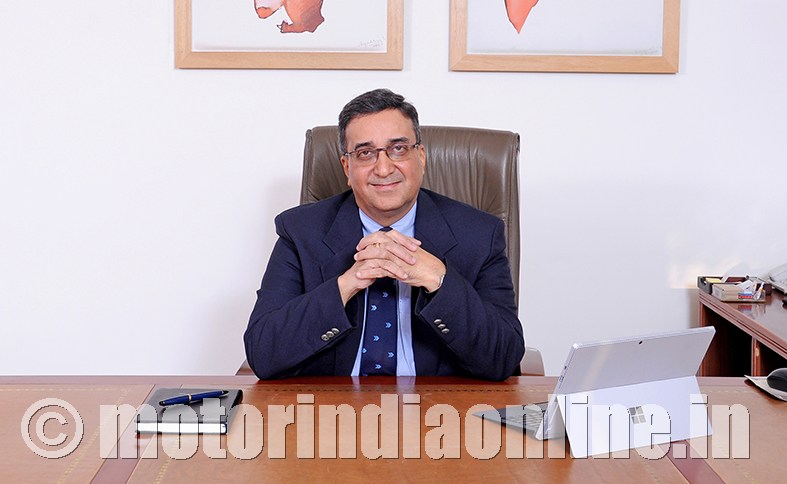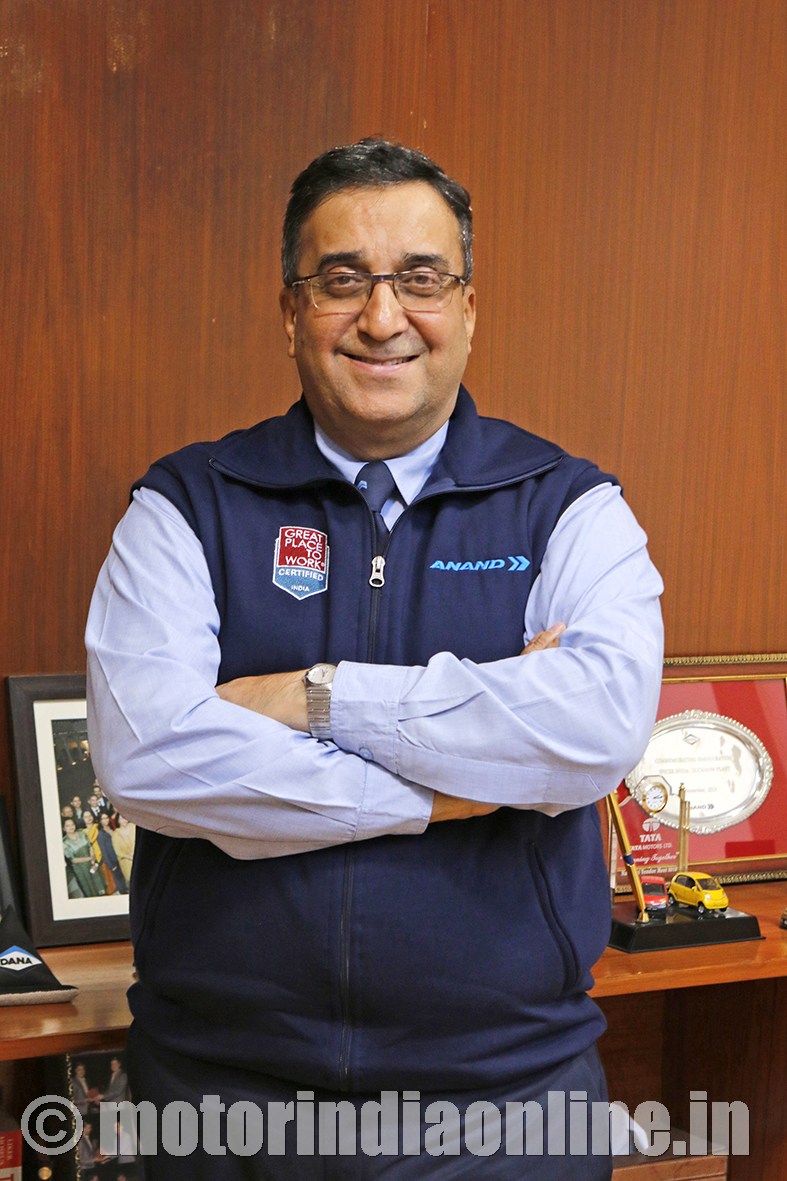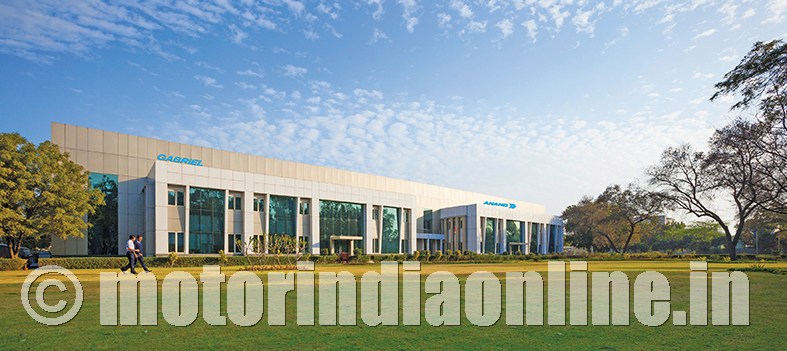Mr. Deepak Chopra, CEO of Anand Group, tells MOTORINDIA how his company’s way of doing business set new standards in terms of innovation and sustainability in auto component manufacturing.

In today’s corporate world, traditional avenues of growth and expansion are no more attractive. Instead, business sustainability has become the ‘North Star’ for all strategic governance, guiding every aspect of planning and investment. Businesses have to look for new opportunities to push further their horizons to meet changing times and can never be complacent with the status quo even when they are flourishing. Long-term thinking is crucial, as is efficiency of processes from tip to toe.
The Anand Group, one of India’s leading automotive components conglomerates, seems to strike a right balance in this regard. Starting with the JV along with Gabriel of the US in 1961, the group now has 19 companies under its fold, offering a wide range of solutions to the automotive industry, including engine, axle, suspension and braking systems. It takes pride for its long-standing global partnerships, 16 joint ventures and seven technical collaborations operating across 62 locations, along with a total workforce of over 16,000.
Apart from the strong footing, the business house remains exemplary in operational and management processes as well. Seven of its group companies were certified ‘Great Place to Work’ (GPTW) by ‘India’s Best Companies to Work For 2017’ survey. In particular, Spicer India, Gabriel India and Anand CY Myutec Automotive have been ranked in the top 52 league among 700 firms from 20 industries in the country and the best in the Auto components sector. Anand proudly believes in its HR motto “Business is 90 per cent people”, making the enterprise people-centric, something that is worth-emulating in the auto components manufacturing industry.
So what makes all the difference at Anand? How does it manage to engender consolidation and sustainability amid consistent pursuit towards higher growth? The CEO, Mr. Deepak Chopra, reveals that the group’s excellence lies in its JV model of business partnerships. “Our evolution all through these years has been a result of partnerships, mostly with overseas partners, that are grown out of trust and transparency towards achieving the shared goals and building on each other’s strengths”, he claims.
The Anand Group does not have any operations outside India, and most of its partnerships involve majority stakes owned by its foreign partners. Yet, that’s where the crux of the company’s admirability lies, especially in terms of domestic sales and access to new technology. “We have a strong pipeline of business and products to the changing demands of the industry with group sales of Rs. 9,400 crores ($1.45 billion) accounting for almost 3.3 per cent of the total sales of Indian auto component industry in 2017. Our aim is to push this figure forward to at least 4 per cent by 2025 to stay among the top three players in the industry, based on ‘Make in India’ or domestic footprint sales”, adds Mr. Chopra.
Future-ready as always
The group’s CEO also opines that their business model puts them in an advantageous position in accessing latest technologies and bring forth cutting-edge manufacturing to India. “We are far ahead in introducing new technologies and products into the market, as our JV partners are leading global players in their respective domains. Since they enjoy majority stakes, they are more comfortable in sharing state-of-the-art technologies without any hesitation or suspicion of misuse. Anand has a phenomenal track record for being a good local partner, by offering value contributions in terms of good HR practices, education and training, productive manufacturing business development and marketing, knowledge of local conditions, laws and regulations and sustainable practices”.
For instance, the group is vibrantly embarking on new product lines that were not part of its portfolio previously. This includes electronic braking systems (ABS and ESC), electronic steering and suspensions systems for passenger cars by its firm Mando to catch up the rising demands from the industry. In the run-up to BS-VI emission norms, its JV company Faurecia, is working together with Cummins to develop and offer engine exhaust systems for both cars and commercial vehicles. Its other JVs are offering diesel particulate filters, EGR and SCR systems, electronic visco clutch, etc. Mahle Behr India is already supplying HVAC systems to CVs far ahead of industry mandates.
Asked about Anand’s preparedness to the disruptive megatrend of electric and connected mobility, Mr. Chopra replied in the affirmative. “We are at the exploratory stage right now as is the industry. Emerging technologies, including EVs, hybrids and cleaner fuels, electronics, connected and autonomous vehicles, are going to dictate the future, and we as a group have significant capacity and will to adapt to changing realities”.
The company has constituted focus group ‘Automotive Growth Council’ to access new technologies, ecosystem, IOT applications, Industry 4.0, light weighting, etc., among other megatrends, so as to explore new avenues of engagement with their existing partners. “Anand is also open to new partners and ventures if need arises”, hints the CEO.
The group is now engaging with the OEMs and inquiring into EV-related products, especially the ones already existing with its current overseas partners. These include electric axles, onboard chargers and voltage convertors, carbon-composites for light weighting, electric motors, and NVH-oriented products. Battery cooling products are already being supplied to players like Mahindra Electric and Tata Motors. It is also taking cognizance of huge investments still going on by global players on making the existing IC-engines cleaner and much more emission friendly, as a competing technology to EVs and Hybrids, at the global level. “We have to be technology agnostic to realize the ultimate goal of going green and being environment-friendly. Various competing technologies like EVs, hybrids, advanced ICEs with alternate or synthetic fuels, etc., need to work on affordable modalities and have to be sustainable, to reduce the carbon footprint of automobiles in a realistic and calibrated manner to be the winning technology”, he says.
But since the transition of the auto industry towards electrics is evident, does that pose any imminent threat to the Anand Group’s businesses of engine parts and exhaust systems? Mr. Chopra rules out the notion, citing that ICE-related products constitute not more than 8 to 9 per cent of the group’s turnover. Yet, he is sure-footed that his technology partners involved in making ICE products are already developing newer technologies to meet the disruption, which can help ANAND think past the inevitability. The group is also expanding its portfolio of products for railways including metro rail and aerospace, and exploring possibility of entering new verticals like commercial aerospace and defense in the near future.
Aiming high
The year 2017 was perhaps very jittery, thanks to the drag effect of demonetization in the initial months, followed by the BS-IV regime and stock pile of BS-III products, and later the GST implementation. “The impact was higher on the aftermarket side, but things started to recover post-August. Mining and road construction activities have picked up, cars and CV sales are again back to momentum. In spite of the drag, we are closing the year with almost Rs. 9,400 crores with a growth rate of around 12 per cent against the previous year”, says the Anand Group CEO.
In fact, the group’s primary business flow is through the OEM route, including OE service for the replacement market. Their direct aftermarket business is considerably lower, thereby escaping the negative impacts in a big way. Exports to their partners have unfolded greatly too, accounting for around 10 per cent of their group sales. That’s a growth of over 15 per cent from the previous year. For 2020, the company has set a target of Rs. 15,000 crores turnover, with a healthy 15 per cent year-on-year growth rate with part contribution coming from inorganic growth.”
“The automotive components industry has in itself demonstrated an impressive performance in the recent times despite its unique bottlenecks, including smaller scale, high infrastructure, power and interest costs and fragmented landscape of Tier 2 and 3 suppliers, compared to global peers. The positive export rate of around 20 per cent by the industry is something to be proud of despite global competition”, observes Mr. Chopra, who is also the co-chairman of ACMA’s Northern region. He outlines soaring production costs due to above factors and narrowing advantage of manpower costs, limited in-house R&D investments, and lack of capacity building at Tier II and Tier III supplier levels as some of the prime challenges that the industry has to overcome.
In a nutshell, on what does the sustainability of Anand Group rest? “Our business philosophy, perhaps”, declares Mr. Deepak Chopra, elucidating that their conception of sustainability pervades beyond environmental protection. People constitute 90% of business, so forging strong partnerships with our tech collaborators, suppliers, OE clients, dealers, and end users has become our lifelong endeavor.
“Moreover, we put our employees at the forefront of our narrative. Our HR management is considered unique, including initiatives like Anand University for training and skilling, Operating Engineer model, Anand Leadership Development Programme (ALDP), dedicated Ethics helpline, preference to women employment, to name a few. “It is this eclectic approach that makes us what we are”, exclaims Mr. Chopra.
Indeed, the Anand Group exemplifies a lot that the Indian automotive components industry can emulate to endure sustainability.

